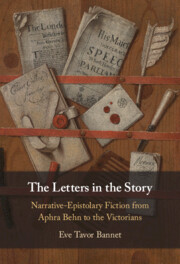Book contents
- The Letters in the Story
- The Letters in the Story
- Copyright page
- Contents
- Preface: “To the Reader”
- Acknowledgments
- Introduction The Letters in the Story
- Chapter 1 Framing Narratives and the Hermeneutics of Suspicion
- Chapter 2 Letters and Empirical Evidence
- Chapter 3 Cultural Expectations and Encapsulating Letters
- Chapter 4 Epistolary Peripeteiae
- Chapter 5 Hermeneutics of Perspective
- Notes
- Index
Chapter 1 - Framing Narratives and the Hermeneutics of Suspicion
Published online by Cambridge University Press: 25 November 2021
- The Letters in the Story
- The Letters in the Story
- Copyright page
- Contents
- Preface: “To the Reader”
- Acknowledgments
- Introduction The Letters in the Story
- Chapter 1 Framing Narratives and the Hermeneutics of Suspicion
- Chapter 2 Letters and Empirical Evidence
- Chapter 3 Cultural Expectations and Encapsulating Letters
- Chapter 4 Epistolary Peripeteiae
- Chapter 5 Hermeneutics of Perspective
- Notes
- Index
Summary
When Henry Fielding embedded two satirical letters in Joseph Andrews in 1742, he and Samuel Richardson were still aspiring newcomers on the novel-writing scene. Eliza Haywood’s enormous popularity as a narrative-epistolary novelist dated from 1719, when her first novel Love in Excess outsold Robinson Crusoe; and Aphra Behn’s Love Letters between a Nobleman and his Sister (1684–1687) had recently been reprinted for the ninth time.1 Modeling an Enlightenment hermeneutics of suspicion, both women authors had used their narrative frames to warn readers against taking letters at face value as honest brokers of their authors’ thoughts and feelings. In Joseph Andrews, Fielding was alluding to their narrative-epistolary fiction as well as to Richardson’s recent, wildly successful epistolary novel, Pamela, when he embedded a letter from Joseph to his sister, Pamela, at the outset of his third-person narrative. Critics who only recognized the allusion to Pamela argued that this letter continued Fielding’s attack on Richardson’s novel by showing that Joseph was as hypocritical and manipulative behind his “pretended innocence” as Pamela was in Shamela.
- Type
- Chapter
- Information
- The Letters in the StoryNarrative-Epistolary Fiction from Aphra Behn to the Victorians, pp. 37 - 78Publisher: Cambridge University PressPrint publication year: 2021



